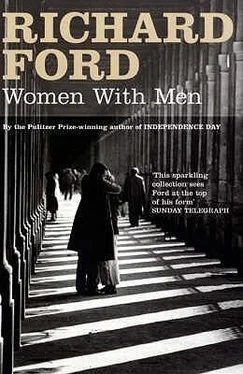Richard Ford - Women with Men
Здесь есть возможность читать онлайн «Richard Ford - Women with Men» весь текст электронной книги совершенно бесплатно (целиком полную версию без сокращений). В некоторых случаях можно слушать аудио, скачать через торрент в формате fb2 и присутствует краткое содержание. Год выпуска: 2006, Издательство: Bloomsbury Publishing PLC, Жанр: Современная проза, на английском языке. Описание произведения, (предисловие) а так же отзывы посетителей доступны на портале библиотеки ЛибКат.
- Название:Women with Men
- Автор:
- Издательство:Bloomsbury Publishing PLC
- Жанр:
- Год:2006
- ISBN:нет данных
- Рейтинг книги:3 / 5. Голосов: 1
-
Избранное:Добавить в избранное
- Отзывы:
-
Ваша оценка:
- 60
- 1
- 2
- 3
- 4
- 5
Women with Men: краткое содержание, описание и аннотация
Предлагаем к чтению аннотацию, описание, краткое содержание или предисловие (зависит от того, что написал сам автор книги «Women with Men»). Если вы не нашли необходимую информацию о книге — напишите в комментариях, мы постараемся отыскать её.
Women with Men — читать онлайн бесплатно полную книгу (весь текст) целиком
Ниже представлен текст книги, разбитый по страницам. Система сохранения места последней прочитанной страницы, позволяет с удобством читать онлайн бесплатно книгу «Women with Men», без необходимости каждый раз заново искать на чём Вы остановились. Поставьте закладку, и сможете в любой момент перейти на страницу, на которой закончили чтение.
Интервал:
Закладка:
Occidentals
CHARLEY MATTHEWS and Helen Carmichael had come to Paris the week before Christmas. When they'd made eager plans for their trip, back in Ohio, they'd expected to stay only two days — enough time for Charley (who'd published his first novel) to have lunch with his French editor, for the two of them to take in a museum, eat a couple of incomparable meals, possibly attend the ballet, then strike off for England, where Matthews hoped to visit Oxford, the school where he'd almost been admitted fifteen years earlier. (At the last minute, he'd been turned down and instead taken his PhD at Purdue, a school he'd always felt ashamed of.)
Things in Paris, however, had not turned out as they'd hoped.
In the first place, the late-autumn weather, which the newspaper in Ohio had predicted would be crisp and dry, with plenty of mild afternoon sunshine — perfect for long walks through the Bois de Boulogne or boat rides on the Seine — had almost overnight turned cold and miserably wet, with a dense, oily fog and rain that made it impossible to see anything and made walking outside a hardship. Matthews noticed in the Fodor's, during the taxi ride from the airport, that Paris was much farther north than he'd imagined — he'd had it nearer the middle. But it lay, he saw, on the same parallel as Gander, Newfoundland, which made what the book said seem logical: that it rained more in Paris than in Seattle and that winter usually started in November. “No wonder it's cold,” he said, watching the unknown, rain-darkened streets drift past. “It's only a half day's drive to Copenhagen.”
The second piece of unexpected news was that François Blumberg, Matthews’ French editor, had called up their first afternoon to see how they were but also to say that his own plans had changed. He was, he said, flying that very afternoon with his wife and four children to somewhere in the Indian Ocean, and so wouldn't be able to invite Matthews to lunch or to visit the publishing house—Éditions des Châtaigniers — which he was closing for the Christmas holidays. The suddenness and rudeness of the cancellation seemed to cause Blumberg satisfaction, though it was Blumberg who'd proposed the whole trip (“We will become good friends then”) and Blumberg who'd made promises to act as Matthews’ guide to Paris, “to special parts tourists would never be lucky enough to see”—secret Oriental gardens in Montparnasse, personal holdings of Blumberg's rich, titled friends, private dining rooms in five-star restaurants, special closed galleries in the Louvre, full of Rembrandts and da Vincis.
“Oh well, of course, certainly, when you come next to Paris we shall have a long, long visit,” Blumberg said on the phone. “No one knows you in France now. But this will all change. After your book is published, everything will change. You'll see. You'll be famous.” Blumberg made a little gasping sound then, the quick, shallow intake of breath that suggested he'd said something which surprised even him. All French people must make this noise, Matthews believed. The one Frenchwoman who taught at Wilmot College, where he'd once taught, made it all the time. He had no idea what it meant.
“I guess so,” Matthews said. He was in bed, dressed in only his pajama top. Blumberg had awakened him from his arrival nap. Helen had gone out into the weather to find lunch, something their hotel, the Nouvelle Métropole, was too impoverished to provide. Outside, on cold, rainy rue Froidevaux, a cadre of motorbikes was revving up and popping, and angry male voices were shouting in French as if a fight was breaking out. Somewhere, a blaring police horn was coming nearer. Matthews wondered if it was heading for their hotel.
“I would personally consider it a favor, though,” Blumberg continued, “if you could stay and meet your translator. Madame de Grenelle. She is very, very famous and also very difficult to persuade on the subject of American novels. But she has found your book fascinating and wishes to see you. Unfortunately, she is also away and will not be in Paris until four days.”
“We weren't planning to stay that long,” Matthews said irritably.
“Well, of course, exactly as you please,” Blumberg said. “Only it would help matters. Translation is not a matter merely of converting your book into French; it is a matter of inventing your book into the French mind. So it is necessary to have the translation absolutely perfect, for people to know it correctly. We don't want you or your book to be misunderstood. We want you to be famous. People spend too much time misunderstanding each other.”
“Apparently,” Matthews said.
Blumberg then gave Matthews Madame de Grenelle's phone number and address and said again that she would be hoping he'd call. From their correspondence, Matthews had always pictured François Blumberg as an old man, a kindly keeper of an ancient flame, overseer of a rich and storied culture that only a few were permitted to share: somebody he would instinctively like. But now he pictured Blumberg as younger — possibly even his own age, thirty-seven — small, pale, balding, pimply, possibly a second-rate academic making ends meet by working in publishing, someone in a shiny black suit and cheap shoes. Matthews thought of Blumberg struggling up a set of rain-swept metal steps toward a smoky, overbooked charter flight, a skinny wife and four kids trailing behind, laden with suitcases and plastic sacks, all shouting at the top of their lungs.
“So,” Blumberg said, as though pressed for time. “Now is, of course, a perfect time to be in Paris. We all go away where it's warm. You have it all to yourselves, you and your friends the Germans. We'll take it back when you're finished.” Blumberg laughed. Then he said, “I hope we can meet each other next time.”
“Right,” Matthews said. “Me, too.” He intended to say something more to Blumberg, to register the upset this change of plans was certain to cause. But Blumberg blurted some indecipherable phrase in French, laughed again, made another quick gasping sound and hung up.
This was, of course, an insult, Matthews understood. No doubt a peculiarly slighting French insult (though he didn't know what a French insult was). But the proper response was to pack their bags, call a taxi, abandon the hotel and take the first conveyance out. He wasn't sure where. Only the rest of the trip would be cast in shadow then, a shadow of disappointment before it ever had a chance to be fun.
Matthews crawled out of bed and went to the window in his bare feet and pajama top. Outside the cold panes, the air was dirty and thick. It didn't feel anything like Christmas. It didn't feel like Paris, for that matter. Directly across rue Froidevaux, a great cemetery spread out into the fog and trees to beyond where he could see, and off to the right in the mist was a huge stone statue of a lion, in the middle of a busy roundabout. Beyond that were ranks of buildings and cars beating up and down a wide avenue, their yellow lights lit in the afternoon gloom. This was Paris.
A police car had stopped in the street below, its blue light flashing, two uniformed officers in luminous white helmets gesticulating to three men on motorcycles. In the past, when he'd imagined Paris, he imagined jazz, Dom Pérignon corks flying into the bright, crisp night air, wide shining streets, laughter. Fun. Now he couldn't even guess which direction he was looking. East? Which direction was the Eiffel Tower? This was the Fourteenth Arrondissement. The Left Bank. Many famous American writers had lived near here, though for the moment he couldn't remember who or where, only that the French had made them feel at home in a way their own countrymen hadn't. He had never particularly wanted to come to Paris. The problem had always seemed to him how to convert anything that happened here into anything that mattered back home. He thought of all the bores who came back and droned on stupefyingly about Paris, trying to make their experience of it matter. It didn't happen naturally . Therefore, to come to Paris with a serious intent meant you'd need to stay. Except you couldn't go to a place you'd never been, expecting to stay. That wasn't travel. That was escape. And he had nothing to escape from. Penny, his estranged wife, had always wanted him to take her “abroad,” but he'd resisted — which had possibly been a mistake.
Читать дальшеИнтервал:
Закладка:
Похожие книги на «Women with Men»
Представляем Вашему вниманию похожие книги на «Women with Men» списком для выбора. Мы отобрали схожую по названию и смыслу литературу в надежде предоставить читателям больше вариантов отыскать новые, интересные, ещё непрочитанные произведения.
Обсуждение, отзывы о книге «Women with Men» и просто собственные мнения читателей. Оставьте ваши комментарии, напишите, что Вы думаете о произведении, его смысле или главных героях. Укажите что конкретно понравилось, а что нет, и почему Вы так считаете.












